HOME >> CHINA
CNN’s reports on China show discrimination, a strong color of Cold War ideology
By Xiao Yan, Qu Xiangyu and Bai Yunyi Source:Global Times Published: 2019/10/29 22:33:40
○ CNN reporter's "out of turn question" groundlessly links China's development to the Essex lorry tragedy accords with Western media's constant malice against China
○ Slandering China is not a new trick for CNN as it used to do so when reporting on March 14 riots in Lhasa
○ CNN's fake news report extends globally and was repeatedly refuted by officials worldwide
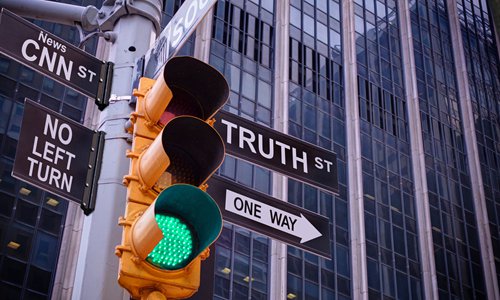
Browsing through CNN's previous reports on China, readers can easily find that the media outlet expressing prejudicial discrimination against China's development, which some Chinese analysts said calls for a forceful response and it make take a long time for CNN to gradually change.
'Out of turn question'
At a routine press conference on October 25, CNN reporter David Culver asked Foreign Ministry Spokesperson Hua Chunying an "out of turn question" as he groundlessly linked the lorry tragedy in UK with China's development in the past 70 years, and made a veiled mockery of it.
"It exposes something in your mind or rather, in the mind of some American media that you represent. What kind of answer did you expect to get from that?" Hua asked.
David Culver, a Cuban-American came to China half a year ago, covered the National Day parade, controversy over the NBA related to the Hong Kong riots, carbon emissions and China's economic development.
Culver's reports frequently uses words like "Communist Party of China (CPC)" and "CPC government," a habit similar to US senator Marco Rubio, who is known for his anti-China sentiments. In the US lexicon, these words demonstrate a strong color of Cold War ideology.
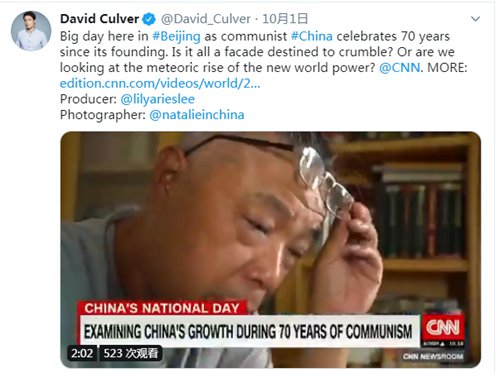
Before asking his question, CNN claimed that its live-streaming program, "39 Chinese people died in British truck" was cut off and hinted that "it is the Chinese government blocking information of its own nationals dying overseas." .
The groundless assumption is apparently untrue as the UK lorry tragedy was a consistent hot topic online in China which Chinese media followed closely.
"I am not surprised at all," Zheng Ruolin, a senior Chinese media professional in France told the Global Times in response to Culver's question.
"If anything in the world can be connected with China from a negative side, [CNN] will definitely do that. This is not the first time and will not be the last," Zheng said.
CNN not only smears China without doing any investigation, but views China as "the root of evil" so they immediately linked the track tragedy to China when the nationality of the 39 dead were revealed, according to Zheng.
Zheng pointed out that smearing China is vital for Western media as China's image is improving within the global community in developing countries and some Western countries, which is unacceptable for some media.
Culver's performance reminded people of CNN's incorrect story, "Hong Kong police using gasoline bombs" from this summer.
Although Hong Kong police made it clear that the gasoline bombs were thrown by the rioters, CNN maliciously tampered pictures to make it look as if bombs were thrown from the police.
CNN finally apologized for the "wrong reports" to Hong Kong police in face of facts.
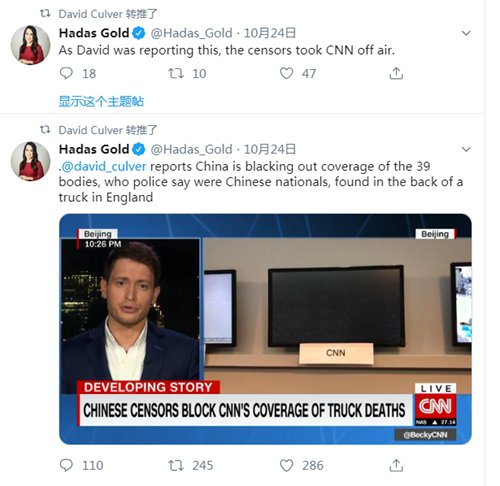
Slander, apology and dirty tricks
CNN staff violating press ethics, infuriating China, and then correcting themselves and apologizing is nothing new.
One example is the reporting of the "March 14 riots" in Lhasa in 2008. Some Western media including CNN neglected legal regulations and basic social justice. They distorted facts and helped build momentum for separatists in Tibet.
After CNN intentionally cropped the photograph and used the wrong appellation for the Tibet Autonomous Region, many Chinese netizens criticized CNN on a website called "anti-CNN.com."
Chinese American communities also protested against CNN's reporting which favored Tibetan separatists on purpose.
CNN later removed the cropped version and put the whole photo which showed separatist Tibetans throwing stones.
In April 2008, CNN anchor Jack Cafferty made insulting remarks in his program "The Situation Room." He said products manufactured in China are "junk" and "I think they're basically the same bunch of goons and thugs they've been for the last 50 years."
At the beginning, CNN used chicanery for Cafferty's insulting words, but both the Chinese government and Chinese people demanded an apology from CNN and Cafferty.
Then Foreign Ministry Spokeswoman Jiang Yu said: "The Chinese people cannot be bullied and humiliated. We once again solemnly urge CNN to seriously deal with the matter, take back the vile remarks and make a sincere apology to all Chinese people."
In protest of Cafferty's racist remarks, at least 5,000 Chinese Americans demonstrated in front of the CNN Building in Los Angeles.
In mid-May 2008, CNN apologized for Cafferty's remarks on China. "CNN has the highest respect for Chinese people around the world and we have no doubt that there was genuine offense felt by them over the Jack Cafferty commentary. On behalf of CNN I'd like to apologize to the Chinese people for that," said then CNN President Jim Walton in a letter to then Chinese ambassador to the United States Zhou Wenzhong.
A senior staff member at CNN said Cafferty felt sorry.
Chinese people were not satisfied with CNN and Cafferty's apologies. Many of them urged decisive action.
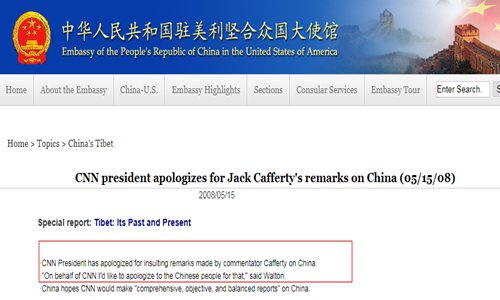
CNN was founded in 1980. After its coverage of the Persian Gulf War, the network's coverage is regarded as the most influential in the US, and is the second most watched network after Fox News. The channel has often courted controversy, such as incendiary comments that ratcheted up tensions between the US and Iran.
In January 2006, when CNN reported the speech of then-president Mahmoud Ahmadinejad of Iran, it deliberately translated "nuclear technology" as "nuclear weapon." CNN quickly issued an apology after Iranian officials issued a warning banning CNN reporters from reporting in Iran.
"The Egyptian media will not be surprised by CNN's handling of the case of 39 bodies found in a van heading to UK," an official responsible for overseas news report at Egyptian state information service (SIS) told the Global Times, adding that CNN and other Western media often give false reports about Egypt.
CNN exaggerates the death toll of terrorist attacks in Egypt, especially in the Sinai Peninsula, an area where strict military control makes it difficult for journalists to enter. Also, the legitimate arrest and detention of violent and terrorist suspects in Egypt were described as "suppressing human rights" and "engaging in political purges."
"Although these media reports on Egypt are inaccurate, the Egyptian authorities usually issue statements of refutation by the SIS out of respect for freedom of expression and balance of various aspects. Otherwise there is no better way," the official said.
Not only in the political sphere, CNN's inaccurate news about Egypt also extended to Egyptian professional footballer Mohamed Salah Hamed Mahrous Ghaly. In June 2018, just before the start of the World Cup in Russia, CNN broke a "shocking news" that Salah, who has been given honorary citizenship in Russia's Chechnya republic by Ramzan Kadyrov, was about to withdraw from the Egyptian national football team.
CNN posted a picture showing Salah in the stadium with the head of the Chechen Republic, Ramzan Kadyrov, alluding that Salah would play for Russia.
The news was immediately refuted by the press officer of the Egyptian football team and Russia Today.
The official also gave a case about how to respond to unscrupulous reports by Western media, telling that one of his jobs is to often strike back at some of the Western media's inaccurate reports about Egypt in the first place.
He mentioned a British newspaper's report of alleged organ theft from a British tourist who died suddenly while on holiday in Egypt. The body of the tourist was returned home with missing organs. However, after checking with Egyptian Civil Affairs Authority and Ministry of Justice, the SIS found out that the allegations of "organ theft" were unfounded because samples were taken during autopsy and the heart, parts of the liver, kidneys and other organs had been removed in order to establish the cause of death, with the knowledge of the family.
To clarify the facts, the SIS issued a statement to registered foreign journalists.
Russian Foreign Minister Sergey Lavrov once joked that CNN was "fake news". Lavrov had a brief press conference following his meeting with US Secretary of State Mike Pompeo, on the sidelines of the Arctic Council in Rovaniemi, Finland in May.
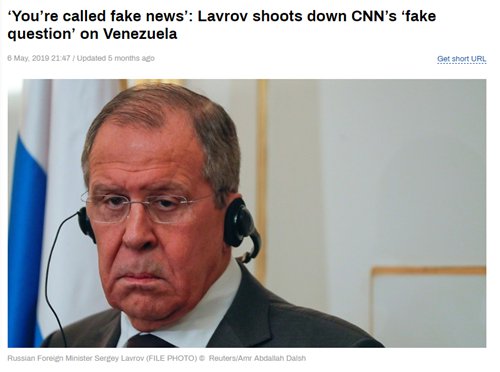
A CNN reporter asked what "leverage or opportunities" Russia had to stop a US military intervention in Venezuela. "Some call your company CNN 'fake news,' and now you are asking a fake question," Lavrov replied, Russia Today reported.
The Russian Ministry of Foreign Affairs listed reports containing fake news on its official website. At least 60 articles were listed, including those from CNN, the New York Times and the Financial Times.
Russian media also criticized CNN and some other outlets for their double standards on street violence in Hong Kong and Catalonia.
Some African countries refused to allow CNN reporters to cover elections because of alleged interference in their countries' internal affairs.
One television host told the Global Times that American viewers who grew up watching CNN knew nothing about the US outside Washington and even less about the world outside the US.
In January 2018, US President Donald trump and his campaign launched a "fake news trophy" contest. CNN accounted for four of the top 10 fake news stories, which were all clarified by other media or corrected by CNN itself.
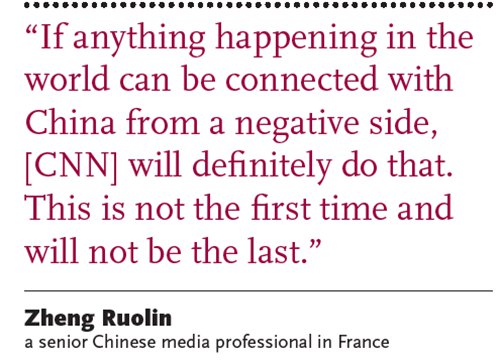
"Negative China stories will continue to exist. And the Western media will hype them or try very hard to link some negative news to China and criticize China's political systems," Zhang Yiwu, a professor from Peking University, told the Global Times.
Zhang said that some Western media have a stereotype of China, which is made clear by their anti-China bias.
The new generation of the Western journalists should get rid of the influence of Sinophobic coverage and get a full picture of China's development, Chinese experts said.
Although some media distribute fake news and show poor ethics, Chinese people will not reject all reports on China written by Western reporters.
Zheng said that tarnishing China has become an "instinct" of some Western media and it may take a long time to change the impression, as well as a younger generation making an effort to understand China.
Cong Chao, Wu Zhiwei and Liu Yupeng contributed to the story
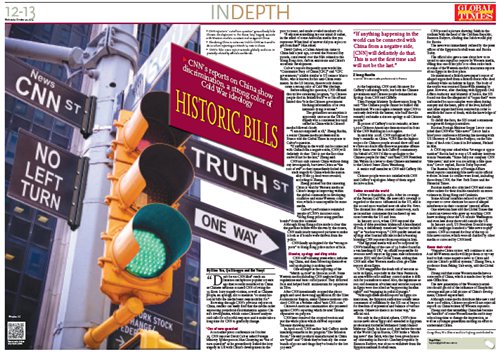
Newspaper headline: Historic bills
○ Slandering China is not a new trick for CNN as it used to do so when reporting on March 14 riots in Lhasa
○ CNN's fake news report extends globally and was repeatedly refuted by officials worldwide

Photo: IC
"Don't be too CNN-like!" reads an Internet catchphrase popular 11 years ago that recently resurfaced in China as Chinese netizens accused CNN of owing the 39 Essex lorry tragedy victims, as well as Chinese people, an apology, not to mention "so many historical bills the media bears responsibility for."Browsing through CNN's previous reports on China, readers can easily find that the media outlet expressing prejudicial discrimination against China's development, which some Chinese analysts said calls for a forceful response and it make take a long time for CNN to gradually change.
'Out of turn question'
At a routine press conference on October 25, CNN reporter David Culver asked Foreign Ministry Spokesperson Hua Chunying an "out of turn question" as he groundlessly linked the lorry tragedy in UK with China's development in the past 70 years, and made a veiled mockery of it.
"It exposes something in your mind or rather, in the mind of some American media that you represent. What kind of answer did you expect to get from that?" Hua asked.
David Culver, a Cuban-American came to China half a year ago, covered the National Day parade, controversy over the NBA related to the Hong Kong riots, carbon emissions and China's economic development.
Culver's reports frequently uses words like "Communist Party of China (CPC)" and "CPC government," a habit similar to US senator Marco Rubio, who is known for his anti-China sentiments. In the US lexicon, these words demonstrate a strong color of Cold War ideology.

A screenshot shows one of David Culver's tweets on China's National Day refering to the People's Republic of China as communist China.
Before asking his question, CNN claimed that its live-streaming program, "39 Chinese people died in British truck" was cut off and hinted that "it is the Chinese government blocking information of its own nationals dying overseas." .
The groundless assumption is apparently untrue as the UK lorry tragedy was a consistent hot topic online in China which Chinese media followed closely.
"I am not surprised at all," Zheng Ruolin, a senior Chinese media professional in France told the Global Times in response to Culver's question.
"If anything in the world can be connected with China from a negative side, [CNN] will definitely do that. This is not the first time and will not be the last," Zheng said.
CNN not only smears China without doing any investigation, but views China as "the root of evil" so they immediately linked the track tragedy to China when the nationality of the 39 dead were revealed, according to Zheng.
Zheng pointed out that smearing China is vital for Western media as China's image is improving within the global community in developing countries and some Western countries, which is unacceptable for some media.
Culver's performance reminded people of CNN's incorrect story, "Hong Kong police using gasoline bombs" from this summer.
Although Hong Kong police made it clear that the gasoline bombs were thrown by the rioters, CNN maliciously tampered pictures to make it look as if bombs were thrown from the police.
CNN finally apologized for the "wrong reports" to Hong Kong police in face of facts.

A screenshot shows David Culver retweets posts of CNN reporter Hadas Gold. The post claims that Culver's live-streaming report of the Exssex tragedy on October 24 was blacked out in China, in contradiction to the facts disseminated online in Chinese.
Slander, apology and dirty tricks
CNN staff violating press ethics, infuriating China, and then correcting themselves and apologizing is nothing new.
One example is the reporting of the "March 14 riots" in Lhasa in 2008. Some Western media including CNN neglected legal regulations and basic social justice. They distorted facts and helped build momentum for separatists in Tibet.
After CNN intentionally cropped the photograph and used the wrong appellation for the Tibet Autonomous Region, many Chinese netizens criticized CNN on a website called "anti-CNN.com."
Chinese American communities also protested against CNN's reporting which favored Tibetan separatists on purpose.
CNN later removed the cropped version and put the whole photo which showed separatist Tibetans throwing stones.
In April 2008, CNN anchor Jack Cafferty made insulting remarks in his program "The Situation Room." He said products manufactured in China are "junk" and "I think they're basically the same bunch of goons and thugs they've been for the last 50 years."
At the beginning, CNN used chicanery for Cafferty's insulting words, but both the Chinese government and Chinese people demanded an apology from CNN and Cafferty.
Then Foreign Ministry Spokeswoman Jiang Yu said: "The Chinese people cannot be bullied and humiliated. We once again solemnly urge CNN to seriously deal with the matter, take back the vile remarks and make a sincere apology to all Chinese people."
In protest of Cafferty's racist remarks, at least 5,000 Chinese Americans demonstrated in front of the CNN Building in Los Angeles.
In mid-May 2008, CNN apologized for Cafferty's remarks on China. "CNN has the highest respect for Chinese people around the world and we have no doubt that there was genuine offense felt by them over the Jack Cafferty commentary. On behalf of CNN I'd like to apologize to the Chinese people for that," said then CNN President Jim Walton in a letter to then Chinese ambassador to the United States Zhou Wenzhong.
A senior staff member at CNN said Cafferty felt sorry.
Chinese people were not satisfied with CNN and Cafferty's apologies. Many of them urged decisive action.

A screenshot of the website Embassy of the People's Republic of China in the US showing CNN president's apology for Jack Cafferty's remarks on China in May 2008.
Stains around the worldCNN was founded in 1980. After its coverage of the Persian Gulf War, the network's coverage is regarded as the most influential in the US, and is the second most watched network after Fox News. The channel has often courted controversy, such as incendiary comments that ratcheted up tensions between the US and Iran.
In January 2006, when CNN reported the speech of then-president Mahmoud Ahmadinejad of Iran, it deliberately translated "nuclear technology" as "nuclear weapon." CNN quickly issued an apology after Iranian officials issued a warning banning CNN reporters from reporting in Iran.
"The Egyptian media will not be surprised by CNN's handling of the case of 39 bodies found in a van heading to UK," an official responsible for overseas news report at Egyptian state information service (SIS) told the Global Times, adding that CNN and other Western media often give false reports about Egypt.
CNN exaggerates the death toll of terrorist attacks in Egypt, especially in the Sinai Peninsula, an area where strict military control makes it difficult for journalists to enter. Also, the legitimate arrest and detention of violent and terrorist suspects in Egypt were described as "suppressing human rights" and "engaging in political purges."
"Although these media reports on Egypt are inaccurate, the Egyptian authorities usually issue statements of refutation by the SIS out of respect for freedom of expression and balance of various aspects. Otherwise there is no better way," the official said.
Not only in the political sphere, CNN's inaccurate news about Egypt also extended to Egyptian professional footballer Mohamed Salah Hamed Mahrous Ghaly. In June 2018, just before the start of the World Cup in Russia, CNN broke a "shocking news" that Salah, who has been given honorary citizenship in Russia's Chechnya republic by Ramzan Kadyrov, was about to withdraw from the Egyptian national football team.
CNN posted a picture showing Salah in the stadium with the head of the Chechen Republic, Ramzan Kadyrov, alluding that Salah would play for Russia.
The news was immediately refuted by the press officer of the Egyptian football team and Russia Today.
The official also gave a case about how to respond to unscrupulous reports by Western media, telling that one of his jobs is to often strike back at some of the Western media's inaccurate reports about Egypt in the first place.
He mentioned a British newspaper's report of alleged organ theft from a British tourist who died suddenly while on holiday in Egypt. The body of the tourist was returned home with missing organs. However, after checking with Egyptian Civil Affairs Authority and Ministry of Justice, the SIS found out that the allegations of "organ theft" were unfounded because samples were taken during autopsy and the heart, parts of the liver, kidneys and other organs had been removed in order to establish the cause of death, with the knowledge of the family.
To clarify the facts, the SIS issued a statement to registered foreign journalists.
Russian Foreign Minister Sergey Lavrov once joked that CNN was "fake news". Lavrov had a brief press conference following his meeting with US Secretary of State Mike Pompeo, on the sidelines of the Arctic Council in Rovaniemi, Finland in May.

A screenshot of RT's report on Russian Foreign Minister Sergey Lavrov joking that CNN is"fake news"
A CNN reporter asked what "leverage or opportunities" Russia had to stop a US military intervention in Venezuela. "Some call your company CNN 'fake news,' and now you are asking a fake question," Lavrov replied, Russia Today reported.
The Russian Ministry of Foreign Affairs listed reports containing fake news on its official website. At least 60 articles were listed, including those from CNN, the New York Times and the Financial Times.
Russian media also criticized CNN and some other outlets for their double standards on street violence in Hong Kong and Catalonia.
Some African countries refused to allow CNN reporters to cover elections because of alleged interference in their countries' internal affairs.
One television host told the Global Times that American viewers who grew up watching CNN knew nothing about the US outside Washington and even less about the world outside the US.
In January 2018, US President Donald trump and his campaign launched a "fake news trophy" contest. CNN accounted for four of the top 10 fake news stories, which were all clarified by other media or corrected by CNN itself.

Know their rules
"Negative China stories will continue to exist. And the Western media will hype them or try very hard to link some negative news to China and criticize China's political systems," Zhang Yiwu, a professor from Peking University, told the Global Times.
Zhang said that some Western media have a stereotype of China, which is made clear by their anti-China bias.
The new generation of the Western journalists should get rid of the influence of Sinophobic coverage and get a full picture of China's development, Chinese experts said.
Although some media distribute fake news and show poor ethics, Chinese people will not reject all reports on China written by Western reporters.
Zheng said that tarnishing China has become an "instinct" of some Western media and it may take a long time to change the impression, as well as a younger generation making an effort to understand China.
Cong Chao, Wu Zhiwei and Liu Yupeng contributed to the story

Newspaper headline: Historic bills
Posted in: IN-DEPTH